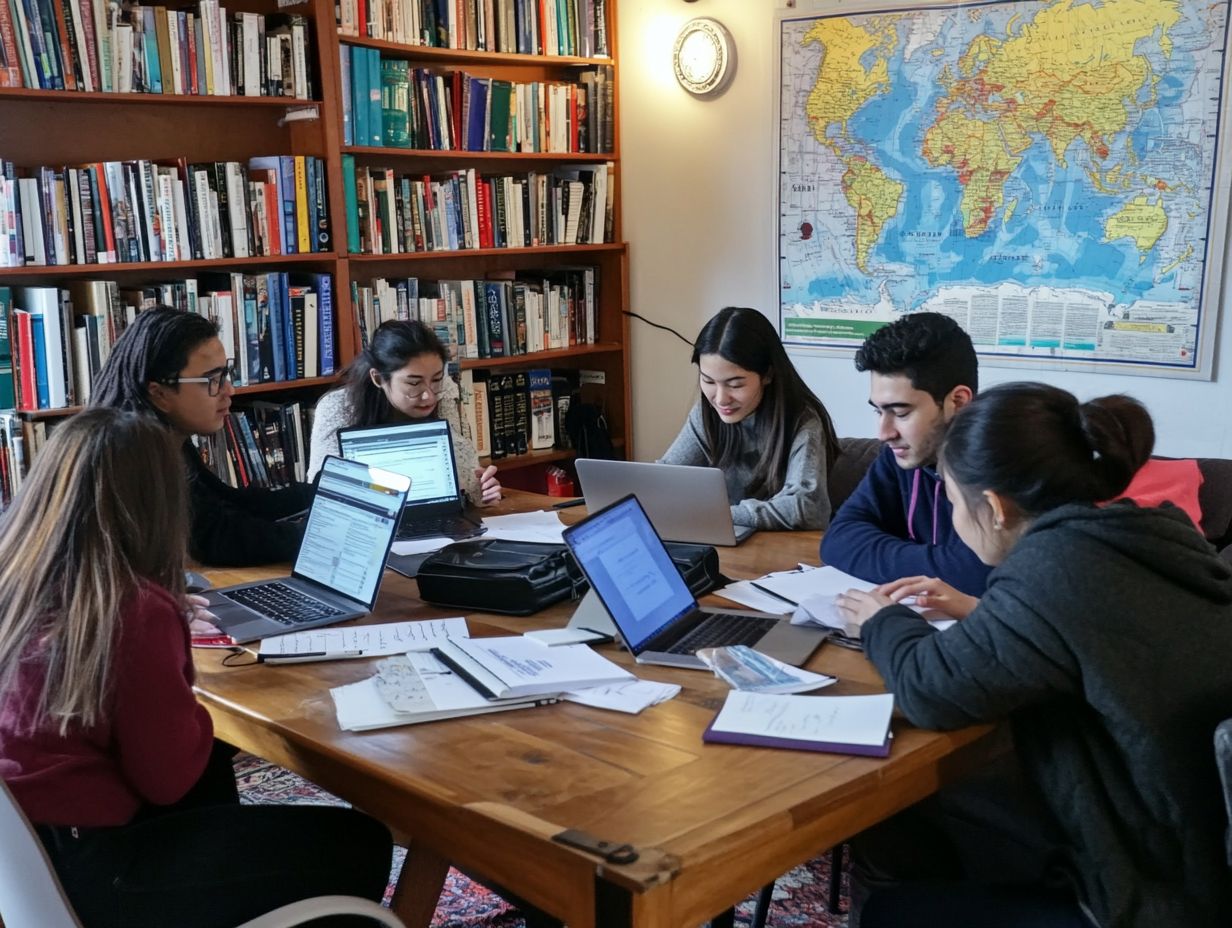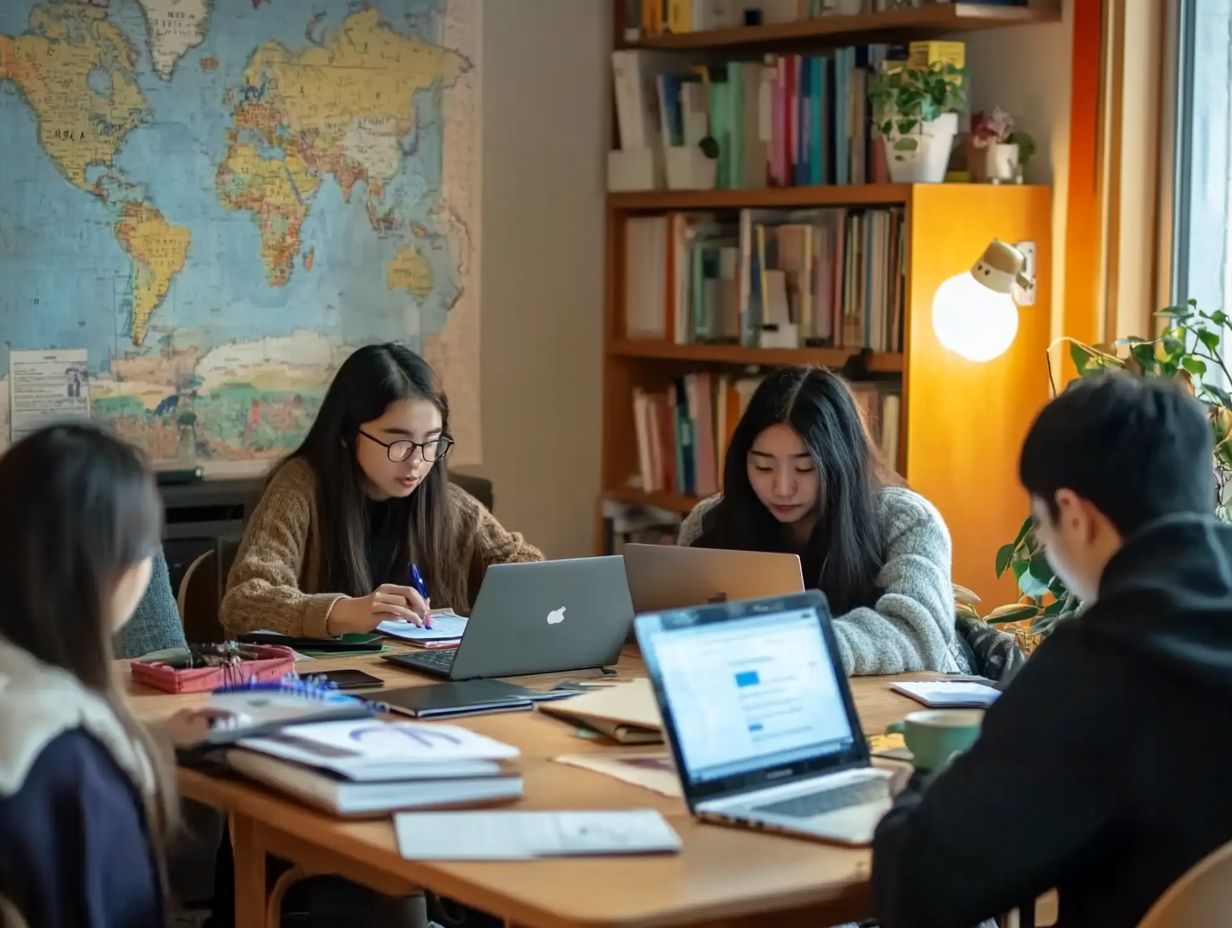Tips for International Students Applying Abroad
Studying abroad presents an exhilarating yet intimidating adventure, offering you a gateway to diverse cultures, enriching experiences, and unparalleled opportunities. Don t miss out on the adventure of a lifetime!
Start your journey well before you board that plane. From selecting the ideal destination and grasping visa requirements to maneuvering through the application process and exploring financial aid options, there is much to contemplate.
This guide accompanies you through every step, ensuring you adapt seamlessly to a new culture and thrive academically while maximizing the benefits of your international experience.
Contents
Key Takeaways:

- Research and carefully choose your desired destination to ensure a smooth transition into studying abroad.
- Familiarize yourself with visa requirements and start the application process early to avoid delays.
- Look into scholarship and funding opportunities to help alleviate financial burdens.
Preparing for Studying Abroad
Prepare for your journey by immersing yourself in the local culture, planning your finances, and understanding the academic support systems available to you. This preparation facilitates a seamless transition into your new environment and fosters personal growth.
By equipping yourself to navigate the intricacies of a foreign education system, you can truly maximize your global opportunities and enrich your experiences at esteemed institutions like Texas A&M University.
Choosing a Destination
Choosing a destination for your study abroad journey is pivotal. It can profoundly shape your academic and cultural experience, presenting a wealth of diverse perspectives and global opportunities.
As you weigh your options, consider various factors that will enhance your journey. Cultural immersion is key to deeply enriching your understanding of the world. The academic quality of institutions, such as Texas A&M University, is also crucial, ensuring that your educational experience is both rigorous and rewarding.
Language plays a significant role too. Studying in a location where your desired language is spoken sharpens your practical skills and boosts your fluency. Additionally, the support systems offered by universities can greatly influence your comfort and success as an international student.
Ultimately, aligning your personal goals with what a destination offers can lead to a transformative experience, fostering both personal and professional growth.
Understanding Visa Requirements
Understanding visa requirements is essential for your study abroad application journey. It ensures compliance with immigration regulations and helps you secure your student visa smoothly.
Familiarize yourself with the various types of visas available, ranging from student visas to work permits, each with specific guidelines. Pay close attention to application procedures, which typically require submitting important documents such as acceptance letters, proof of financial means, and academic transcripts.
Health insurance is another critical aspect, as many countries mandate it to safeguard students during their stay. Requirements can differ significantly depending on your destination. Some countries impose additional obligations like language proficiency tests or police certificates. Stay informed about these details to streamline your application process and enhance your chances of success.
Application Process for International Students

The application process for international students involves a series of essential steps. These include preparing your application documents, adhering to university deadlines, and crafting a compelling personal statement that showcases your unique strengths and experiences.
This competitive journey requires meticulous attention to detail, ensuring that your application stands out and resonates with admission teams at prestigious institutions like Texas A&M University.
Required Documents and Deadlines
As an international student, you’ll need to gather essential application documents such as academic transcripts, letters of recommendation, and proof of English proficiency to effectively meet university deadlines.
It’s important to prepare a comprehensive personal statement and evidence of financial support, such as bank statements or scholarship letters. These documents showcase your ability to fund your studies abroad. Adhering to specific submission deadlines set by the universities typically several months before the academic year begins is crucial for timely processing.
Keep in mind that application fees can vary significantly, so budgeting for these expenses is a smart move. Preparing early alleviates the stress of last-minute submissions and gives you time to refine your applications, making them more competitive.
Financial Considerations
Financial considerations are pivotal in shaping your study abroad experience. Careful budgeting is essential to cover housing costs, living expenses, and potential student loans.
Don t overlook the importance of exploring scholarships and funding options that can help ease your financial burden.
Scholarship and Funding Opportunities
Scholarships and funding opportunities are invaluable assets for you as an international student. They offer financial aid that can significantly reduce the costs of studying abroad.
These scholarships can be categorized into several types:
- Merit-based awards that commend academic excellence.
- Need-based grants designed for those facing financial challenges.
- Program-specific options tailored for students pursuing particular fields of study.
When applying for these scholarships, you’ll typically need to submit an application form, academic transcripts, and sometimes personal essays or letters of recommendation.
These scholarships also provide more than financial support. They encourage community engagement through service projects or extracurricular activities, enriching your educational journey and fostering a deeper connection with your host community.
Adjusting to a New Culture

Adjusting to a new culture is a vital aspect of the study abroad experience. It offers you the opportunity to immerse yourself in cultural nuances while navigating differences that can enhance your personal growth and deepen your understanding of American culture.
Navigating cultural differences is essential as an international student during your study abroad experience. It fosters personal growth and a deeper understanding of American culture.
It’s not just about learning in class; it’s also about making friends and understanding different viewpoints. You might find yourself surprised by informal communication styles, like using first names with professors and peers, which can feel different from more formal interactions.
To thrive in this new environment, embrace these differences by asking open-ended questions and actively participating in discussions. This approach enriches your learning experience and highlights the importance of cultural sensitivity. It helps you appreciate the nuances of social norms and practices unique to your surroundings.
Overcoming Homesickness
Overcoming homesickness is a challenge many international students face during their study abroad journey. It’s essential to employ strategies that foster cultural immersion and personal growth.
To navigate this emotional hurdle effectively, consider exploring various avenues that encourage connection and community. Engaging with student organizations promotes cultural exchange and provides a robust support network, making your new environment feel welcoming.
Additionally, volunteering serves as a powerful tool to integrate into the local community. It allows you to contribute positively while meeting others who share similar interests, enriching your experience further.
Don t underestimate the importance of maintaining regular communication with family and friends back home. This connection provides comfort and reassurance, reminding you of your support system and easing your transition while enhancing your academic journey abroad.
Tips for Academic Success
Succeeding academically while studying abroad requires you to develop good study habits, master time management skills, and make the most of the academic support resources available to you.
Engaging in extracurricular activities is crucial, as they play a significant role in your professional development.
Study Habits and Time Management

Developing effective study habits and strong time management skills is essential as you navigate new academic expectations.
You’re likely facing unique challenges that influence your learning experience. Embracing techniques like active learning can significantly enhance your understanding and retention of the material. Engaging with content through discussions, teaching others, or applying concepts in real-world situations solidifies your grasp and builds confidence in your abilities.
Organization is key when juggling your responsibilities. Keeping a planner or using digital tools helps you track assignments, exams, and cultural events effectively. Balancing academics with enriching experiences is within reach by applying time management strategies like the Pomodoro Technique, which allows you to enjoy focused study sessions punctuated by breaks to recharge and immerse yourself in the vibrant culture around you.
Utilizing Campus Resources
Utilizing campus resources, including academic support and advising, is essential for you as an international student. These resources are your lifeline, offering essential help to enhance your study abroad experience and achieve your academic goals.
These resources provide critical assistance in navigating your coursework and promote your overall well-being during your time away from home. Accessing tutoring services can help clarify challenging subjects, while mental health support offers a safe space to discuss personal struggles and stress.
Academic advisors play a vital role in helping you plan your courses and understand institutional policies, ensuring you stay on track for graduation. By tapping into these resources, you empower yourself to make the most of your educational journey and thrive in an unfamiliar environment.
Frequently Asked Questions
What are Some Tips for International Students Applying Abroad?
-
Start planning early. Begin your application process as soon as possible. This gives you time to gather all necessary documents and meet deadlines.
-
Research your options. Explore different countries, universities, and programs to find what suits you best. Check visa requirements and consider the cost of living.
-
Prepare your documents. Gather all required documents such as your academic records, test scores, and letters of recommendation. Make sure they are translated and certified if needed.
-
Understand the admissions process. Get familiar with each university’s requirements. Some have different criteria specifically for international students.
-
Highlight your strengths. Show off your unique qualities and experiences in your application. This can help you stand out from other applicants.
-
Seek guidance. Connect with current or former international students for advice, and consider reviewing tips for online study abroad applications. University advisors can also provide valuable assistance during the application process.






